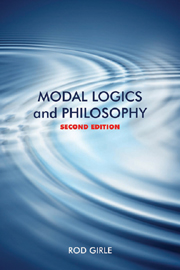12 - Epistemic logic
from Part 2 - Applications
Summary
Introduction
If we interpret the ☐ as “It is known that”, then we have an epistemic interpretation of modal logic. If we interpret the ☐ as “It is believed that”, then we have a doxastic interpretation of modal logic. Epistemic logic gives us a logic for knowledge, and doxastic logic gives us a logic for belief.
Since knowledge and belief both involve some knower or believer, many epistemic and doxastic logics use a subscript with the modal operator to indicate the agent. If the agent were a, then we would have ☐a. If several agents were to be considered, then we would have a logic for each agent.
It is usual to distinguish epistemic from doxastic logic by replacing the ☐ with K for knowledge, and with B for belief. So we translate:
Kap as a knows that p
and Bap as a believes that p
Epistemic and doxastic logics were proposed by a variety of people. One classic early paper was Lemmon's “Is there only one correct system of modal logic?” (1959). The classic summary and complete proposal for epistemic and doxastic logic is to be found in Hintikka's Knowledge and Belief (1962).
We shall focus mainly on the propositional part of Hintikka's epistemic and doxastic logics. We then discuss some of the issues generated by these logics. There will be a brief discussion of epistemic free logic.
S4 Knowledge
Hintikka's epistemic logic is straightforwardly an epistemic interpretation of S4.
- Type
- Chapter
- Information
- Modal Logics and Philosophy , pp. 178 - 199Publisher: Acumen PublishingPrint publication year: 2009
- 15
- Cited by



